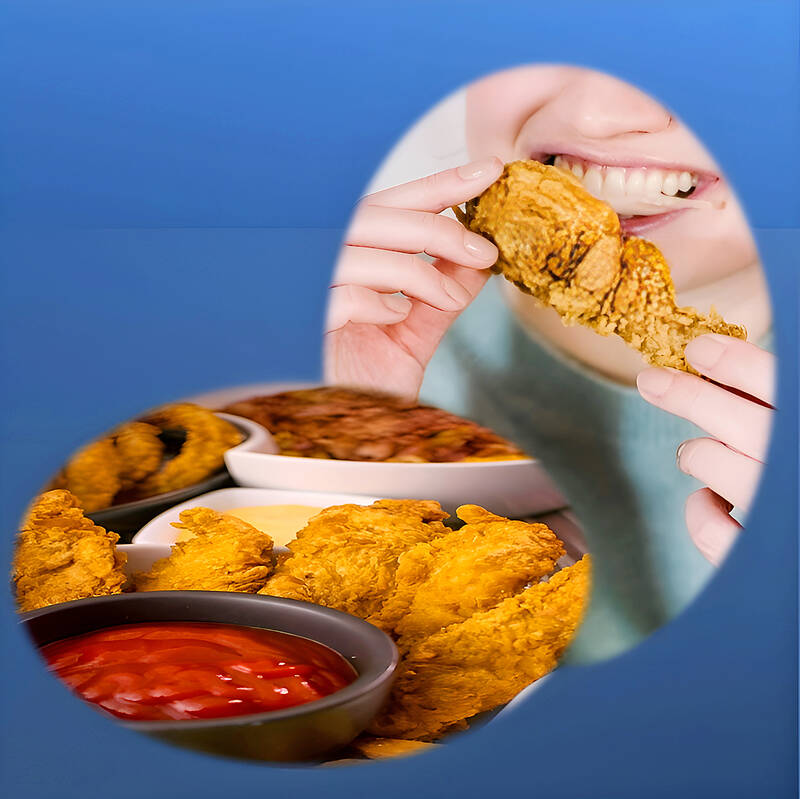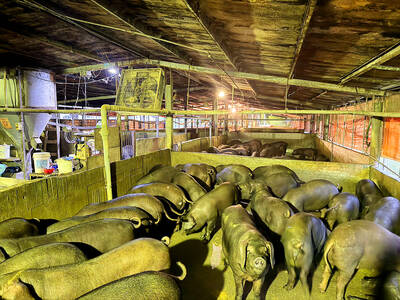對話 Dialogue
清清:華華,你在看什麼?看得這麼入神?
Qīngqing: Huáhua, nǐ zài kàn shénme? Kàn de zhème rùshén?

Photo: Pexels / 照片:Pexels 提供
華華:7月6號是國際炸雞日,好幾家店都推出了各種優惠活動,我正在比較吃什麼好。
Huáhua: Qī yuè liù hào shì Guójì Zhájīrì, hǎojǐ jiā diàn dōu tuīchūle gèzhǒng yōuhuì huódòng, wǒ zhèngzài bǐjiào chī shénme hǎo.
清清:哇!太好了!我也趕快來看看,除了炸雞,不知道雞排店是不是也有特價?我好想吃雞排加珍珠奶茶!
Qīngqing: Wa! Tài hǎole! Wǒ yě gǎnkuài lái kànkan, chúle zhájī, bùzhīdào jīpáidiàn shì búshì yěyǒu tèjià? Wǒ hǎo xiǎng chī jīpái jiā zhēnzhū nǎichá!
華華:原來你也是炸雞控,不過雞排加珍奶也太過份了吧?太不健康了!
Huáhua: Yuánlái nǐ yě shì zhájī kòng, búguò jīpái jiā zhēnnǎi yě tài guòfènle ba? Tài bú jiànkāngle!
清清:好吃的東西哪裡有健康的?而且我是為了慶祝國際炸雞日欸!但怎麼會有這樣的節日啊?好有趣喔!
Qīngqing: Hǎochī de dōngxi nǎlǐ yǒu jiànkāng de? Érqiě wǒ shì wèile qìngzhù Guójì Zhájīrì ei! Dàn zěnme huì yǒu zhèyàng de jiérì a? Hǎo yǒuqù o!
華華:我也不知道,網路的資料說是來自美國,但不確定是不是真的。
Huáhua: Wǒ yě bù zhīdào, wǎnglù de zīliào shuō shì lái zì Měiguó, dàn bú quèdìng shì búshì zhēnde.
清清:哎!管他的,開心吃炸雞最重要。
Qīngqing: Ai! Guǎntāde, kāixīn chī zhájī zuì zhòngyào.
華華:是啊!那到時候我們就一起訂這家的,中午好好吃一頓吧!
Huáhua: Shì a! Nà dàoshíhòu wǒmen jiù yìqǐ dìng zhèì jiā de, zhōngwǔ hǎohao chī yí dùn ba!
翻譯 Translation
Qingqing: Huahua, what are you looking at? You seem so engrossed!
Huahua: July 6 is International Fried Chicken Day. Several places are offering various promotions, and I’m comparing which ones to go for.
Qingqing: Wow, that’s great. I’ll check, too. Besides fried chicken, I wonder if the chicken cutlet shops are also having discounts? I’m craving chicken cutlets with bubble tea.
Huahua: So, you’re a fried chicken fan, too! But chicken cutlets with bubble tea? That’s too much! It’s so unhealthy!
Qingqing: Where’s the health in tasty food? Plus, it’s to celebrate International Fried Chicken Day. But how did this holiday come about? It’s so interesting.
Huahua: I’m not sure either. The information online says it originated in the US, but I’m not certain if that’s true.
Qingqing: Ah, who cares? Enjoying fried chicken is the most important thing.
Huahua: Exactly. Then let’s order from this place together and have a great lunch on that day.
生詞 Vocabulary
1. 炸雞 (zhájī) fried chicken
2. 控 (kòng) [slang] an enthusiast or fanatic
of something specific
3. 入神 (rùshén) engrossed, absorbed
4. 推出 (tuīchū) launch, introduce
5. 雞排 (jīpái) fried chicken cutlet
6. 珍珠奶茶/珍奶 (zhēnzhū nǎichá/zhēnnǎi) bubble tea
7. 健康 (jiànkāng) health, healthy
8. 管他的 (guǎntāde) Who cares? Whatever!
教材音檔 Audio Files
國立清華大學華語中心提供
By National Tsing Hua University Chinese Language Center:

For many people in Taiwan, childhood memories of rural life include pig pens standing beside family homes. Leftover rice, vegetable scraps and soup from daily meals were poured into buckets and fed to pigs. This practice of feeding pigs with household food waste was once a common way of life, both an economic choice and an expression of agricultural society’s deep respect for conserving resources. From a practical standpoint, pigs are omnivorous animals capable of efficiently digesting food scraps that humans can no longer eat. For rural households, food waste cost almost nothing, yet it could be converted into pork, a

Tango unfolds in a dimly lit room, where a haunting melody ushers two dancers into a close embrace. Here, music and movement merge into a silent yet passionate conversation, expressing longing, memory and shared purpose. What makes tango truly magical is the deep interaction and spontaneous improvisation between partners. Tango began in the late 19th century in Buenos Aires, Argentina’s bustling capital. Born in the poor working-class neighborhoods and busy port areas, this dance emerged from a melting pot of cultures. European immigrants, African slaves and local residents all contributed to its unique character. From these rich influences, tango

A: What show are you watching online? B: I’m watching “Fly Me to the Moon & Back” – an exhibition launched by the Taipei Music Center (TMC) to commemorate the late singer Tom Chang. A: Known for his sky-high notes, Chang is praised as one of the best singers in the 1990s. His death at the age of 31 was a major loss indeed. B: And I’m so glad that we went to the TMC’s 90s-themed concert last Friday. I finally saw the iconic “Godmother of Rock” WaWa perform live. A: This year-end show also featured singers Princess Ai, Bii, Wayne Huang, PoLin and

Continued from yesterday(延續自昨日) https://www.taipeitimes.com/News/lang The loss of sea stars significantly impacts the ocean ecosystem. Sea stars are important __6__ that help control populations of mussels and sea urchins. Among them, the sunflower star is one of the largest and fastest sea stars and is adept at preying on sea urchins. Without sea stars, sea urchins can __7__ in numbers and devastate kelp forests. These forests are essential __8__ for many marine animals and also help capture carbon from the atmosphere, which is vital in the fight against climate change. The mystery behind SSWD is still __9__, but it is clear that